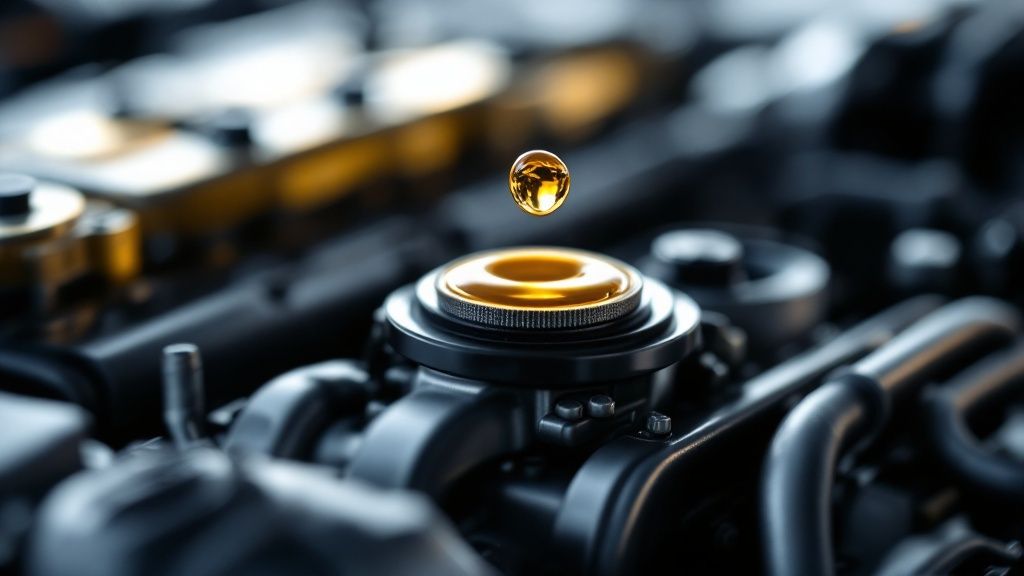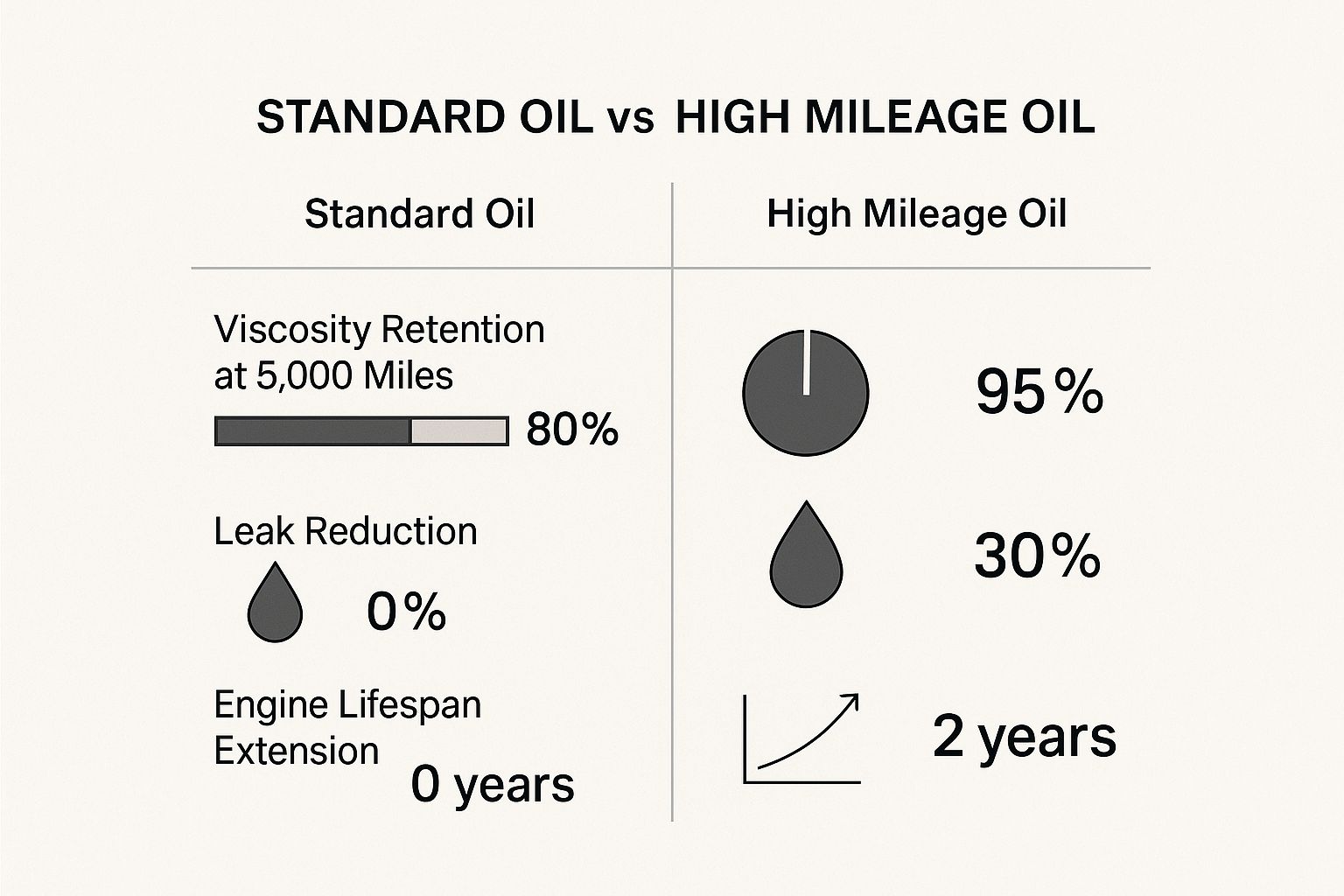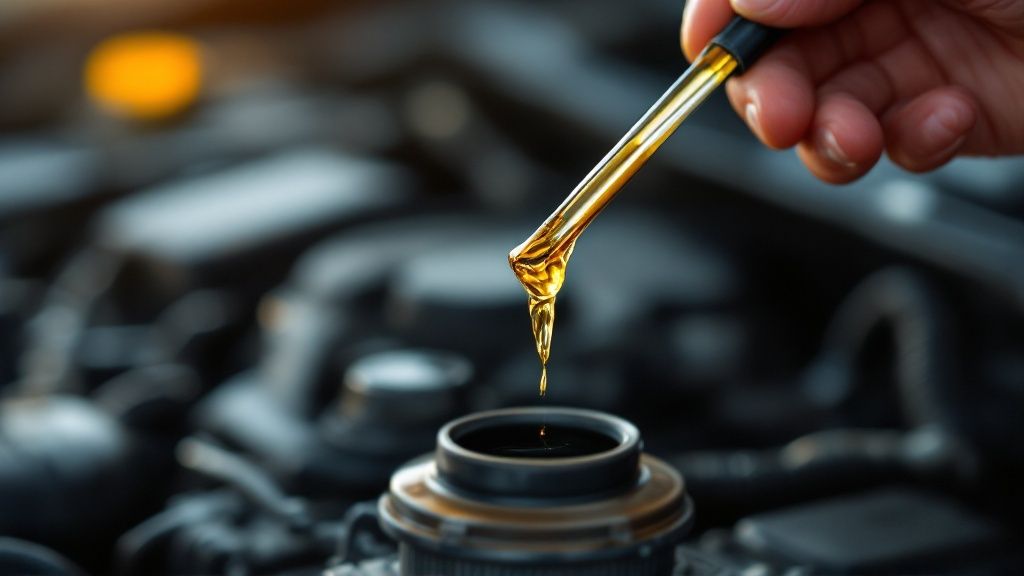
As your car racks up miles, its engine undergoes internal wear and tear. These changes, often unseen, affect both performance and lifespan. Think of a well-worn hiking boot: over time, it needs different care than a new one. An older engine develops unique wear patterns requiring a specialized approach to lubrication. That's where high mileage oil changes become essential.
High mileage oils are designed for the specific challenges of older engines. Engine seals can dry out and harden, leading to leaks. High mileage oils contain seal conditioners that revitalize these seals, preventing leaks and maintaining oil pressure.
Older engines are also prone to sludge. High mileage oils include enhanced detergent packages to dissolve sludge and prevent further buildup. This keeps components clean and lubricated.
To maximize your engine's life, understanding maintenance is key. Similar to maintaining any complex machine, preventative care is crucial. Learn more about maintaining machinery.
The increasing age of vehicles on the road drives the need for high mileage oil changes. The average vehicle age in the U.S. reached 12.1 years in 2021, a trend seen globally. This aging fleet has increased demand for specialized lubricants designed for engines with over 75,000 miles.
The global high mileage motor oil market was valued at $12.5 billion in 2022. Projections estimate it will reach $18.3 billion by 2030, with a CAGR of 6.4% from 2024 to 2030. This highlights the importance of these specialized oils. Find more statistics on the High Mileage Motor Oil Market.
Beyond mileage, your engine may show signs it needs a high mileage oil change. Increased oil consumption, oil leaks, or blue exhaust smoke during cold starts are potential indicators. These can signal worn seals and increased internal clearances, problems high mileage oils address.
By recognizing these signs and switching to a high mileage oil, you can protect your engine from further wear and extend its life.

The infographic above illustrates the key differences between standard and high mileage oil. It focuses on viscosity retention, leak reduction, and how it extends the engine's lifespan. The data clearly shows high mileage oil significantly outperforms standard oil in these crucial areas. This translates to enhanced engine protection and increased longevity for your vehicle.
High mileage oil changes do more than just lubricate your engine's moving parts. They are specifically designed for engines with over 75,000 miles, addressing the unique challenges that come with higher mileage. Regular oil changes are crucial for engine health. For a deeper dive into the benefits, check out this resource: Benefits Of Oil Change.
One of the primary benefits of high mileage oil is the inclusion of seal conditioners. These special compounds revitalize dried-out engine seals, much like applying lotion to dry skin. The conditioners work by penetrating and rejuvenating the rubber seals. This restores their flexibility and helps prevent leaks, maintaining proper oil pressure within the engine.
Over time, sludge can build up in your engine and affect its performance. High mileage oils contain enhanced detergent packages designed to dissolve this sludge gradually. Unlike harsh engine flushes, these detergents work gently. This minimizes the risk of dislodging large debris chunks that could clog oil passages. The gradual cleaning action helps restore engine cleanliness and improve overall lubrication.
High mileage oil also benefits from viscosity modifiers. These additives ensure the oil maintains the correct thickness, or viscosity, across a range of temperatures. This is especially important in older engines with increased clearances between moving parts. Maintaining proper viscosity ensures adequate lubrication and oil pressure as the engine wears.
Furthermore, antioxidants in high mileage oil prevent the accelerated oil breakdown common in older engines. This extends the oil's lifespan and further protects the engine. Combined, these benefits contribute to improved performance and a longer engine life.
To further illustrate the differences between high mileage and regular oil, let's look at a comparison table:
High Mileage Oil vs. Regular Motor Oil: Key Differences
This table compares the formulation, benefits, and ideal application scenarios for high mileage oils versus conventional motor oils
| Feature | High Mileage Oil | Regular Motor Oil |
|---|---|---|
| Seal Conditioners | Included | Not Included |
| Detergent Packages | Enhanced | Standard |
| Viscosity Modifiers | Specialized for higher mileage | Standard |
| Antioxidants | Higher concentration | Standard |
| Ideal Application | Engines over 75,000 miles | Engines with lower mileage |
| Primary Benefit | Addresses age-related engine wear | General lubrication and protection |
As you can see, high mileage oil offers targeted protection for older engines. Its specialized additives address the specific challenges these engines face.
The demand for high mileage oil changes is increasing, reflecting a growing trend in the automotive industry. The global oil change service market, encompassing high mileage oil changes, was valued at $164.76 billion in 2024. Projections indicate it will reach nearly $239.74 billion by 2032. This growth is fueled by the increasing number of vehicles on the road and the necessity of regular maintenance. Discover more insights about the oil change service market. As more people keep their cars longer, high mileage oil changes are becoming vital for preserving vehicle health and performance.

Just like a seasoned athlete needs specific care, your high-mileage engine requires specialized attention. Your vehicle communicates its need for a high mileage oil change through various symptoms. Recognizing these signs is key to maintaining your engine's health and performance.
One of the clearest signs is increased oil consumption. While some oil consumption is normal, a significant increase often indicates worn engine parts. For example, worn valve seals can allow oil into the combustion chamber, leading to oil loss and blue exhaust smoke, especially during cold starts.
Small oil puddles under your parked car can also indicate oil leaks. Hardened or cracked seals, a common problem in older engines, often cause this. However, leaks aren't the only issue. Increased internal engine clearances, due to wear on piston rings, can also contribute to higher oil consumption and reduced performance.
Professional mechanics utilize several diagnostic techniques to evaluate your engine's health. These techniques can identify problems such as deteriorating valve seals and worn piston rings. This data helps determine if a high mileage oil is necessary.
Certain driving habits, like frequent short trips or stop-and-go city driving, can necessitate specialized oil sooner. These driving styles place greater stress on the engine, contributing to faster oil breakdown and increased wear. This is where high mileage oil, with its beneficial additives and viscosity modifiers, becomes important.
The best high mileage oil for your car depends on various factors, including vehicle type, climate, and driving habits. For example, vehicles in extreme temperatures might benefit from synthetic high mileage oils, offering enhanced protection in hot and cold conditions. The growth of the oil change market highlights the rising demand for these specialized services. As of 2024, the U.S. oil change service market was valued at $8.11 billion and is expected to grow at a CAGR of 5.9% from 2025 to 2030. This growth is driven by factors such as rising vehicle ownership and increased vehicle use. Learn more about the oil change market. Choosing the right high mileage oil based on your vehicle’s specific needs can address age-related wear and extend your engine's life.

Choosing the right high mileage oil can feel overwhelming. With so many options available, it's easy to get lost in the technical terms and marketing jargon. This section helps clarify the key differences between oil types so you can find the perfect formula for your high-mileage vehicle. Protecting your engine and maximizing its lifespan starts with the right oil.
There are three primary types of high mileage oil: conventional, synthetic blend, and full synthetic. Each offers different levels of protection and performance.
Conventional high mileage oil is a good option for vehicles with less demanding driving conditions. It's the most budget-friendly choice, but it breaks down faster than synthetic alternatives.
Synthetic blend high mileage oil combines conventional oil with synthetic base stocks. This blend offers a balance of cost and performance, providing improved protection and longevity compared to conventional oil.
Full synthetic high mileage oil delivers the ultimate protection and performance. Engineered to resist breakdown and withstand extreme temperatures, it's the ideal choice for vehicles driven in harsh conditions or with demanding driving styles.
Viscosity, the oil's thickness, plays a vital role in engine lubrication. Older engines often benefit from a higher viscosity oil due to increased wear and tear.
A 10W-30 or 10W-40, for example, might be more suitable for your high-mileage engine than a thinner 5W-20. The right viscosity ensures proper oil pressure and reduces oil consumption in worn engines. Always consult your owner's manual for the recommended viscosity for your specific vehicle.
Motor oils carry various certifications, including the API (American Petroleum Institute) certification. The current standard is "SP," which signifies oils meeting the latest performance requirements.
While certifications are important, don't get bogged down by them when choosing high mileage oil. Focus on selecting the correct viscosity and oil type recommended for your vehicle.
Full synthetic oils offer superior protection but come with a higher price tag. Conventional oils are the most affordable, but they require more frequent changes. Synthetic blends offer a good compromise. Consider your budget and driving habits when making your selection.
To help you compare some popular options, we've put together the following table:
High Mileage Oil Product Comparison Comparison of popular high mileage oil products across different price points, formulation types, and specialized features.
| Product | Type | Viscosity Options | Key Additives | Price Range | Best For |
|---|---|---|---|---|---|
| Valvoline MaxLife | Synthetic Blend | 5W-20, 5W-30, 10W-30, 10W-40 | Seal conditioners, antioxidants, detergents | Mid-range | Reducing leaks and oil consumption in older engines |
| Castrol GTX High Mileage | Synthetic Blend | 5W-20, 5W-30, 10W-30, 10W-40 | Phosphorus replacement technology, anti-wear additives | Mid-range | Protecting against deposit formation and wear |
| Pennzoil High Mileage | Conventional | 5W-20, 5W-30, 10W-30, 10W-40 | Seal conditioners, viscosity modifiers | Budget-friendly | Everyday driving in older vehicles |
| Mobil 1 High Mileage | Full Synthetic | 0W-20, 5W-20, 5W-30, 10W-30 | SuperSyn anti-wear technology, antioxidants | Premium | High-performance engines and extreme driving conditions |
This table highlights some key differences in formulation, additives, and ideal use cases. Remember to always check your owner's manual for specific recommendations.
Several reputable brands offer high mileage oil formulations. The best choice depends on your engine's specific needs and wear patterns. Researching brand reputations and reading customer reviews can be valuable in making your decision.
Understanding the nuances of high mileage oil helps you make informed decisions about your vehicle's maintenance. At Kwik Kar Spring Valley, our experienced technicians understand the unique needs of aging engines. We offer tailored advice based on your vehicle's age, make, model, and driving conditions. Visit us today for expert service and to ensure your engine performs at its best for years to come.
Maintaining your vehicle becomes increasingly important as the miles add up. Performing a high mileage oil change yourself can be a rewarding experience and a great way to save money, all while extending the life of your engine. This guide offers a detailed walkthrough specifically for the needs of high-mileage vehicles.
Before starting, gather your supplies: high mileage oil with the correct viscosity, a new oil filter, a wrench for the drain plug, a filter wrench, a drain pan, a funnel, gloves, and jack stands. Safety is key, so always work on a level surface and ensure your vehicle is securely supported by jack stands before you go under it. Vehicles with over 100,000 miles are typically considered high mileage.
Locate the oil drain plug underneath your vehicle. Place the drain pan directly beneath it and carefully loosen the plug using your wrench. Once loose, remove the plug completely and let the old oil drain out. This is a good opportunity to check the old oil for any metal particles, a potential sign of internal engine wear.
While the oil is draining, turn your attention to the oil filter. Use the filter wrench to loosen and remove the old filter. Before putting on the new one, lubricate the gasket with a bit of fresh oil. This will help create a proper seal. For vehicles experiencing marginal oil pressure, consider pre-filling the new filter with oil to prime the system upon starting. This can help prevent your engine from running dry, even briefly.
After the old oil has finished draining, reinstall the drain plug. Avoid overtightening, especially if the threads are worn. A torque wrench can be very helpful in achieving the proper tightness. Now, screw on the new oil filter by hand, tightening it according to the manufacturer’s instructions.
Find the oil fill cap under the hood and remove it. Using a funnel, carefully pour in the correct amount of high mileage oil, referring to your owner's manual for the specific quantity. Once filled, replace the fill cap.
Start the engine and let it run for a few minutes. This circulates the fresh oil and allows the filter to fill completely. Turn off the engine and wait a few minutes for the oil to settle. Check the oil level with the dipstick, adding more oil as needed to reach the "full" mark.
Used motor oil is considered hazardous waste and needs to be disposed of correctly. Many auto parts stores and service centers have used oil recycling programs. Never pour used oil down the drain or onto the ground.
Professional mechanics often use techniques to save time, like using a quick-release drain plug or a specialized filter wrench. These tools can make the process quicker and more efficient while maintaining safety and quality.
High mileage oil changes are especially important for vehicles with over 75,000 miles, a service we specialize in at Kwik Kar Spring Valley. Our experienced technicians understand the specific needs of older engines and use top-quality high mileage oil formulations designed to maximize your engine’s life and performance. Visit us today for professional and dependable service.
Switching to high mileage oil is an important step in protecting your car's engine. But finding a reliable service provider is just as critical. Many shops don't fully grasp the specific needs of engines with higher mileage. This guide will help you select a service center that's truly equipped to care for your well-loved vehicle.
Asking the right questions can tell you a lot about a shop's understanding of high mileage oil changes. Don't hesitate to ask about their procedures for vehicles with over 75,000 miles. For instance, find out if they use a specific high mileage oil and which brands they recommend for different engine types. Also, ask about how they check for leaks and address potential problems with seals. A knowledgeable technician will be happy to discuss these details.
Any trustworthy shop should perform certain diagnostic checks with every high mileage oil change. Checking the used oil for metal particles can indicate internal wear and tear. Examining the oil filter for debris and sludge buildup gives additional clues about the engine's health. A thorough visual check of engine seals and gaskets is also important for identifying possible leaks. These checks are key to catching small problems early, preventing them from becoming costly repairs.
Some red flags can suggest a shop might not be the best fit for your high-mileage car. Be wary of shops that push unnecessary add-on services or suggest engine flushes without a good reason. Also, be cautious of shops that don't seem to understand the difference between standard oil and high mileage oil. And if a shop dismisses your questions or rushes the service, it's probably best to find another option.
Different service providers offer varying levels of expertise and cost. Independent shops often specialize in certain makes and models, allowing for more personalized service and fostering long-term customer relationships. Dealerships have access to manufacturer-specific training and information, but their services can be pricier. Quick lubes prioritize speed and convenience, but they might not provide the same level of detailed inspection and personalized care. The right type of service provider for you depends on your individual needs and your vehicle's specific condition.
Knowing the typical price range for a high mileage oil change can help you avoid overpaying. Prices will differ depending on your location and the type of oil used, but a standard high mileage oil change should fall within a reasonable range. Be wary of shops that significantly inflate prices or recommend unnecessary extras. A good high mileage oil change doesn't have to come with a bunch of expensive add-ons.
Building a relationship with a mechanic who knows your vehicle is a smart investment in the long run. A trusted mechanic can offer personalized advice, anticipate potential issues, and help you make informed decisions about maintaining your high-mileage car. This can save you money and help your engine last longer.
Keep your high-mileage vehicle running smoothly with expert care at Kwik Kar Spring Valley. Our experienced technicians understand the needs of older engines and use premium high mileage oil for optimal performance and longevity. We offer transparent pricing, convenient hours, and a commitment to customer satisfaction. Schedule your high mileage oil change today and experience the Kwik Kar difference.


Get upto $20 OFF on all services.